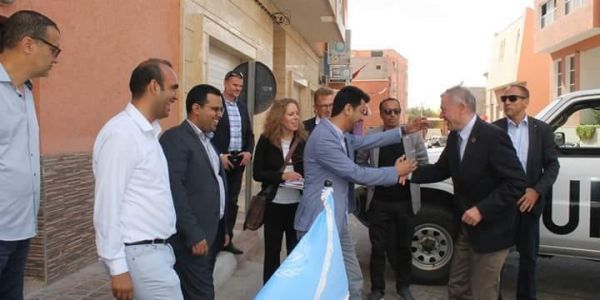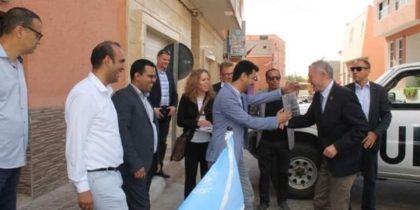
Köhler Says his Meetings in Sahara Provinces Were Fruitful
 The personal envoy of the UN Secretary-General for the Moroccan Sahara, Horst Köhler, described as “fruitful” the various meetings he held in Laayoune, Smara and Dakhla during his first visit to the Moroccan southern provinces.
The personal envoy of the UN Secretary-General for the Moroccan Sahara, Horst Köhler, described as “fruitful” the various meetings he held in Laayoune, Smara and Dakhla during his first visit to the Moroccan southern provinces.
“I am satisfied with this visit during which I met many people and visited different places,” said Horst Köhler in a statement upon leaving Laayoune Sunday at the end of his tour in the region that also led him to Algiers, a camp in Tindouf, Nouakchott, and Rabat.
He said his various meetings had been fruitful and the visit to the Southern Provinces gave him an opportunity “to deepen his understanding of the issue”.
Köhler, who inquired about the development efforts in the region and the projects launched under the Southern Development Model, welcomed the progress and development achieved in the region, particularly at the economic and social levels.
He noted that the final settlement of the Sahara issue will attract more investment in the region and create jobs, especially for youths.
The personal envoy of the UN Secretary General for the Sahara stressed, in this regard, his willingness to work towards a mutually acceptable solution.
During his visits to Laayoune, Smara and Dakhla, Köhler held a series of meetings with elected officials, community leaders, shioukhs, Sahrawi tribes’ elders and civil society activists. All his interlocutors reaffirmed their commitment to the autonomy initiative as the only lasting solution to the Sahara artificial conflict.
They also stressed the need to pressure Algeria to authorize a census of the inhabitants of the Tindouf camps.
The UN Secretary General’s personal envoy also visited the headquarters of the regional human rights commissions in Laayoune and Dakhla, where he was briefed on the commissions’ work and on the situation of human rights in the region.
Köhler thus took note of the progress made in the promotion and protection of human rights following the reforms initiated by Morocco in this area.
Köhler’s second tour in the region and his first trip to the Sahara provinces came after the adoption of resolution 2414 last April, which reaffirmed the primacy of the autonomy plan and called for a realistic solution and compromise in order to reach a political solution to the Sahara issue.
The resolution also urged “the neighboring States to cooperate more fully with the United Nations and with each other and to strengthen their involvement and to achieve progress towards a political solution”.
“Neighboring countries” mainly refers to Algeria, which needs to shoulder its responsibility as a stakeholder in this conflict.
Morocco insists in this connection that no direct negotiations can be undertaken with the Polisario unless Algeria is also brought to the table.
Morocco also maintains that a political solution to the Sahara is only possible within its territorial sovereignty and stresses that the UN is the only body entitled to lead negotiations on the issue.
